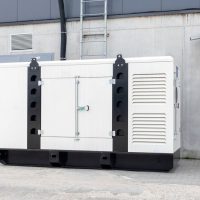Aboveground Storage Tank (AST) regulations for Emergency Power in High-rise Buildings in New Jersey

New Jersey law imposes strict guidelines when it comes to emergency power systems in high-rise buildings, which are critical for ensuring the safety and security of building occupants during power outages. Those strict requirements cover Aboveground Storage Tanks (ASTs) that store the fuel used to power these systems, including their installation, operation, maintenance, and more. Learn more below about common AST regulations for emergency power in high-rise buildings, and contact Lutz Companies for help with underground or aboveground storage tank installation, removal, or site remediation in New Jersey or Florida.
Installation and Design Standards
ASTs must be designed and installed to meet the standards set forth by the National Fire Protection Association (NFPA), particularly NFPA 30 (Flammable and Combustible Liquids Code) and NFPA 110 (Standard for Emergency and Standby Power Systems). These standards cover the tank’s construction, capacity, placement, and secondary containment requirements to prevent leaks and spills.
In New Jersey, the installation of ASTs may also need to comply with the International Building Code (IBC) and the International Fire Code (IFC), which are adopted and modified by state regulations. These codes address the location of tanks relative to buildings, property lines, and sources of ignition, as well as access for emergency responders.
Operational Safety
Operational safety measures include regular inspections and maintenance of ASTs to prevent leaks, corrosion, and structural failures. New Jersey’s Department of Environmental Protection (NJDEP) mandates specific operational practices, including regular inspections, leak detection systems, and emergency response plans.
Emergency Power System Requirements
For high-rise buildings, emergency power systems must be capable of providing sufficient power to critical systems such as lighting, fire alarms, elevators, and communication systems. The capacity of ASTs should be aligned with the requirements of maintaining these systems for a specified duration, typically at least 72 hours, as per NFPA 110.
Environmental Protection
To protect the environment from potential spills and leaks, ASTs must have adequate secondary containment systems, such as double-walled tanks or dyked areas. These measures are designed to contain leaks and prevent them from contaminating the surrounding soil and groundwater.
Compliance and Enforcement
In New Jersey, compliance with AST regulations is enforced by various state and local agencies, including notably NJDEP. Building owners and operators must ensure that their ASTs and emergency power systems are inspected and certified by qualified professionals. Non-compliance can result in significant fines, remediation costs, and potentially, the shutdown of the facility.
Contact Lutz Today for Help With USTs and ASTs in Florida and New Jersey
Understanding and adhering to the stringent regulations governing ASTs for emergency power in high-rise buildings is crucial to providing emergency power systems that are safe, reliable, and ready to operate during a power outage, thereby protecting the building’s occupants and the environment. Building owners and managers should work closely with experienced contractors who are familiar with their state’s specific requirements for ASTs to ensure compliance and safeguard their properties and occupants.
For help with the installation, maintenance, or removal of aboveground or underground storage tanks on your property, contact Lutz Petroleum Equipment Installation in Florida at 954-971-5222 or Herbert Lutz Co., Inc. in New Jersey at 908-862-8888. We can assess your specific needs and provide solutions that best suit your operational requirements and regulatory obligations.
